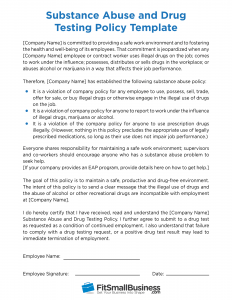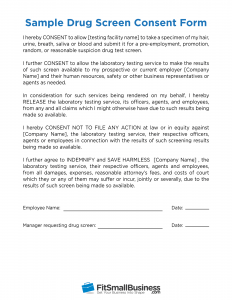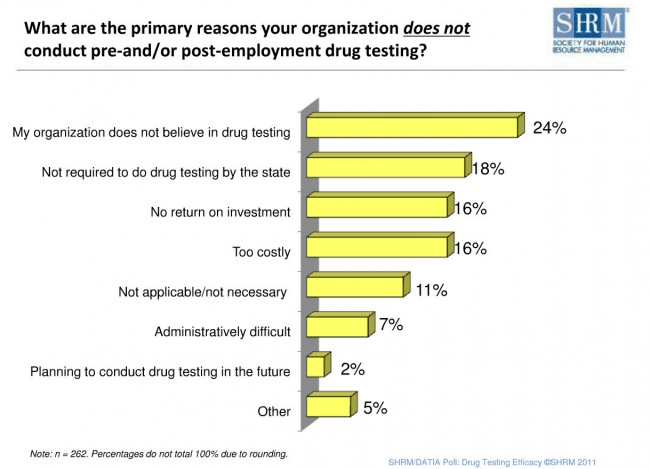Setting up employee drug screening, including pre-employment drug testing, necessitates awareness of compliance principles for drug screening, locating certified drug screening suppliers (necessary in some states), and creating a drug testing policy and budgeting for drug screening costs. Even though more than half of businesses drug screen workers, only about 39 percent of small businesses with fewer than 99 employees do so.
These eight steps, including a free drug testing policy template, will assist you to implement employee drug screening.
Step 1: Review Drug Screening Laws in Your Country
There aren’t any federal compliance laws that protect substance abuse screening. Therefore, individual nations and other regulatory agencies have stepped in to describe what’s appropriate and what is not, this type of demanding the employer to offer advanced notice (Alabama, Oklahoma and Washington) or prohibiting random drug testing (Vermont and Rhode Island). The American Civil Liberties Union provides an excellent state-by-state summary.
6 Common Prerequisites for Drug Screens and Pre-employment Drug Testing
Here are the more common requirements for drug screening throughout countries and industries. Consider these as best practice guidelines, even if you’re in a country or industry that does not mandate every one of those. We have supplied a sample drug test policy under.
Provide Advance Notice
Supplying employees with advance notice of your drug testing policy or publishing it in your employee handbook is a good practice and mandated in some states. For example, Florida requires companies to supply 60-days advance notice of their drug screening policy before conducting any employee drug tests.
Provide Test Results
Supplying employees with their evaluation results can be done from the lab itself. However, if you’re in a state which needs you to provide results within 24 hours (South Carolina) or five days (Alaska), you’ll need to be sure this happens to avoid breaking state law.
Allow Employees to Re-test
Some states allow employees to dispute the findings. For example, in Washington state, you can’t terminate an employee based on the first failed test outcome. You’re required to re-test and confirm. The exact same goes in Nevada. However, in Maryland, if an employee wants to become re-tested, they are expected to cover the second test themselves.
Protect Employee Privacy
Since drug test results are medical info, they’re protected in all states by the medical insurance Portability and Accountability Act (HIPAA), a federal law. Consequently, employee evaluation results can’t be shared without previous consent from the employee. You’ll require the employee to sign a form permitting the test results to be shared with you, the employer. The form, known as a general consent, is usually obtained at the drug screening lab. A sample is provided below.
Nonetheless, you have to be cautious that information about an employee’s drug test outcome is not shared inappropriately with individuals in your business or other people who have no right to know, like the employee’s spouse, parents or co-workers.
Collection Methods
Many countries require that medication screening be performed by a certified laboratory. Other states only require that a third party do the testing, whether accredited or not. Some states do not define who does the drug testing. However, as a best practice, we recommend using a certified lab that is not connected in any way with your organization.
Should you fire a person based on the test outcome, using the test results performed by a certified independent lab may protect you as a defense in case of a wrongful termination lawsuit
Federal Contractors
Should you do any recourse for the federal government, you’re likely aware of this Drug-Free Workplace Act of 1988. It has particular requirements for each of the items listed previously, such as requiring a written policy, training employees on developing a drug-free office, drug test notification and penalties for noncompliance. It applies to some company doing work for your government.
Step 2: Find a Drug Screen Provider
Since medication screening is mandated in many businesses, it’s easy to find a national supplier such as Quest Diagnostics or National Drug Screening to test your workers. There are also local possibilities, such as urgent care clinics or hospitals, that can help you. Prices will vary according to the test provider, the medication being tested for and the testing method.
National Drug Screen Providers
There are several national players that provide drug screening for businesses, for example:
- Quest Diagnostics
- US Drug Test Centers
- OHS
- LabCorp
- National Drug Screening
- Concentra
A number of these provide drug testing outside the United States as well. Just call the number on their site or, sometimes, order the test online.
Local Drug Screen Providers
The easiest way to find a reliable local drug test organization is to call businesses in your area which examine their own workers and ask them who they use. Another way is to call the chamber of commerce in your community since they might have a more reliable recommendation than you’ll find on a site ad.
As an example, some hospitals and urgent care centers offer drug testing solutions but may not promote that online. If you do hunt online consider having a keyword phrase like”drug testing services near me” or”employee drug screen in [city ]”. Then, inquire about their prices, including a bundle price if you ship all of your drug tests to them completely. Drug evaluation pricing can vary considerably, and you might have the ability to negotiate a volume discount.
Step 3: Determine Your Drug Screen Prices
The Society for Human Resource Management (SHRM) advises that you can expect to pay between $10 and $30 for a single basic drug test. However, this can increase based on the amount of substances that you test for or the sort of test you’re using. Costs may decrease with quantity discounts.
Some nations, such as Florida, Ohio, and Kentucky, also provide employer incentives for drug testing which can help reduce your drug screening costs.
Measure 4: Document Your Drug Screen Policy
Once you’ve verified your state laws and found a certified facility, make your employees aware of being examined beforehand. Think about adding a drug testing policy for your employee handbook and reviewing it upon hire. Alternatively, notify applicants when conducting interviews that you will drug test before hire.
Next, you may want to notify workers of a positive drug test result and provide them an chance to retake the test, possibly in a different way. For example, let’s state the employee failed a saliva drug test. You could ask a laboratory to confirm the test using a urine sample before you do it, such as employee discipline or termination.
Perhaps you do not yet drug monitor workers since you don’t understand how to make a drug screening policy? We offer templates below.
Free Substance Abuse & Drug Test Policy Templates
If you’re going to drug screen your workers, then we recommend you provide a substance abuse and drug testing coverage so that expectations, responsibilities and consequences are known clearly. You may download a free sample chemical abuse and drug testing coverage as well as a drug screen consent form below.


Source: Adapted from Docracy.com
- Download Sample Drug Testing Policy as a .pdf or .doc file
- Download Sample Drug Screen Consent Form for a .pdf or .doc document
Disclaimer: FitSmallBusiness is a supplier of business information, resources and education and isn’t a law firm. Therefore, please have any policy records reviewed by your small business attorney familiar with applicable federal and state laws before publication and use.
Step 5: Determine When to Drug Screen
Again, some states mandate the conditions under which a drug evaluation could be done. Here are the most Frequent scenarios that may or may not be appropriate based on your business location:
Post-offer and Pre-employment Drug Testing
Drug testing within the office has shown to decrease absenteeism and enhance employee productivity. It also tends to reduce workers compensation claims. According to the SHRM, more than 50% of all employers that do drug tests display during the application procedure — pre-employment.
Here is one security pro’s perspective:
“We find that companies typically drug monitor employment candidates after an offer of employment will be made. The offer of employment will be contingent upon the candidate successfully passing a variety of screens, including a background check and a drug screen.
Pre-employment drug testing is a tool for companies to defend the safety, welfare and health of workers as well as the general public.
Drug testing programs can help reduce employee injury- and – illness-related expenses, including medical care, sick leave and disability benefits. Drug screening is also suggested to get a random basis, according to reasonable suspicion and after workplace accidents.
Even if states have decriminalized or legalized the recreational or medical use of marijuana, that has no bearing on the federal law — it is prohibited — nor does it have some impact on a business decision not to hire people using the drug.”
— Jack Plaxe, Founder and Managing Director, Security Consulting Alliance
However, as mentioned previously, be aware of state laws in all of the states where you employ workers to be positive that pre-employment drug displays are permitted.
For instance, privacy legislation in California mandate that pre-employment drug screening be uniform and consistent to ensure no employment discrimination happens. That means that you can’t just drug screen workers of a certain age or protected status. You would need to drug test all new hires performing a comparable job in California.
Reasonable Suspicion
Another common reason that a number of employers drug test employees is because the worker is behaving in this manner that a manager suspects chemical abuse. It is called”reasonable suspicion” or”probable cause.” For example, if your sales representative gets in a car accident following a business meeting, could alcohol be to blame? In case your very best forklift operator abruptly crashes into a storage stand, might it be a drug-related? In some states, reasonable suspicion is the only valid reason that drug testing is permitted after an employee is hired.
Random
In certain countries, random drug testing is allowed along with drug testing for reasonable suspicion. Of course, random is random, which means that you can not single out one person for drug testing based on a hunch. If you do, you are likely to be in violation of anti-discrimination legislation in the Americans With Disabilities Act of 1990 (ADA) to the Age Discrimination in Employment Act of 1967 (ADEA) or other labor legislation.
Here’s what one safety expert adds:
“As a company operator, we must take the right security precautions when it comes to our prospective employees and for the benefit of the operation of our firm.
The drug screening is merely a security precaution to guarantee us that the worker is healthy and isn’t abusing his or her body with drugs of any sort.”
— Ian McClarty, President, PhoenixNAP Global IT Services
Job Promotion
Similar to a new hire, a few companies like to drug monitor employees as part of a marketing procedure. They do so to ensure that the worker is drug-free until they give him or her more responsibility, for example access to a business bank accounts or direct supervision of employees.
Industry Mandated
The U.S. Department of Transportation (DOT), mandates drug testing for transportation-related jobs, such as airplane pilots, taxi drivers and anybody with a commercial drivers’ license (CDL) as well as people who work in emergency-response functions. If your business functions within any industry under the jurisdiction of the DOT, you will need to abide by its specific guidelines.
Step 6: Determine What Medicines to Display For
There is an extensive selection of substances and drugs which may be screened for on a drug test. Mobile Health Management Services, which offers drug testing in the New York region, indicates the five-panel urine drug screen is the most common, stating,”A five-panel drug evaluation generally tests for commonly abused substances, such as THC, opiates, PCP, cocaine and amphetamines.”
Other companies weigh in on exactly what they test for:
“My employees do a urine screen for nine drugs including:
- Amphetamines
- Methamphetamine
- Marijuana metabolite
- Cocaine
- Opiates
- Phencyclidine (PCP)
- Barbiturates
- Benzodiazepines
- Methadone
- Propoxyphene
- Oxycodone
I miss drugs that show up as a consequence of an employee’s drug regimen.
I am especially biased toward cannabis and other recreational drugs. I won’t hire a seemingly good worker if recreational drugs are recognized.”
— Karrion D. Lalor, Licensed Professional Counselor, Agape Transformation Practice
McClarty adds,”A standard seven-panel drug test generally looks for marijuana, cocaine, opiates, PCP, amphetamines, benzodiazepines and barbiturates. However, a drug screen may be customized to check up to a dozen legal and illegal substances which possess the potential for misuse.”
Screening for Marijuana in States Where Recreational Use is Legal
In states where recreational use is legal, it remains illegal at the federal level. Employers may still choose to screen for it. However, it may be risky to terminate someone because of their nonwork-related recreational drug use in these states if the employee shows no impairment. Similar to alcohol or smoking, recreational drug use does not need to be tolerated at work.
But some companies are choosing to omit the cannabis evaluation or miss out the test results. This is partly because cannabis stays in a person’s system for up to 30 days.
Step 7: Order the Right Kind of Test for Your Medication Screen
Testing can vary from having a worker blow into a tube to having a worker submit a blood sample. Some drug screening tests, such as urine, are easier to get. Other kinds of drug tests are more precise, able to discover drugs used within the previous four hours. We are going to examine five frequent drug screening tests which can be requested.
Urine Test
Quest Diagnostics, used by Karrion Lalor, suggests a pee test is the only DOT approved testing technique. CleanFleet, another drug testing agency focused on the transportation business, confirms urine testing is the most common since it shows current drug use — in just one to five days. Approximately 95 percent of all pre-employment drug evaluations are achieved by urine at an average cost of about $40.
But a urine test can’t detect drug use over the first four hours. Therefore, in that case, a saliva test might be a better screening approach.
Saliva Test
Saliva testing is helpful should you need to understand whether drugs have been used within the last 24 hours. It’s accurate, generally costs less than $15 per employee and admissible in most states that allow testing of body fluids. Even though you can buy these tests online and manage yourself, doing this may be a violation in countries that require a third party testing facility or certified lab.
Alcohol Screen Using Breath
These evaluations monitor blood alcohol content (BAC), according to The Balance, and therefore are just another low-cost alternative that can be administered directly from the company in states which don’t need testing be accomplished by a certified lab. Evaluation kits can be bought online for as low as $7 to get a discount tubing to over $100 for an alcohol breath-testing device.
Blood Test
WebMD says that blood testing isn’t as dependable as urine testing for drug usage, and it’s a great deal more expensive, up to a few hundred dollars per test. Additionally, some individuals have a fear of needles. In general, blood testing for drug use is best saved for when the employee is unconscious, such as following a substantial vehicle accident or office trauma.
Hair Test
According to OHS, the advantage of working with a hair sample is it may test for drugs as far back as 90 days. But, it is far more expensive at greater than $100 per test. You may consider this test if you are hiring for an important role, for example health care employee or executive.
Step 8: Avoid Drug Screening Hazards
You are in a tough spot as a company proprietor. Should you drug test but do not do it correctly, you might have angry workers. If you do not drug test and someone gets hurt by an intoxicated employee, you’re liable as well. We’ll provide the dangers of drug screening . Not medication screening so you can make the best choice for your situation.
Hazards of Pre-employment Drug Testing and Drug Screening Employees
The largest risk of drug screening is that personal health information may be shared in violation of HIPAA, placing your business at risk for a lawsuit. Another danger is that you may terminate an employee based on a drug test, and then end up in a wrongful termination litigation. This could happen, for instance, if the employee wasn’t given a chance to retake the test as required in certain nations.
Otherwise, there are many reasons that companies don’t drug test. Some are listed on the chart below according to information provided by SHRM.

Reasons some employers do not drug test workers
Supply: HireRight
Risks of Screening for Recreational Drugs in States Where They’re Legal
However, to lower your risk of a wrongful termination lawsuit, make sure you have a drug policy and consistently apply it to all employees. Your policy will have to highlight that employees may not use any prohibited substances, such as cannabis.
Your very best bet if your business is in one of the states where cannabis is valid is to seek out the help of your lawyer before finalizing and implementing your employee drug screening policy.
Risks of Not Drug Screening Employees
In some industries, you’ll cause more injury by not drug screening your workers. Four examples of when it may be insecure for your small business not to drug test workers are provided below.
Governmental Violations
As mentioned previously, failing to comply by DOT requirements will introduce you to liability if employees are discovered to be using prohibited substances at work.
Client Safety
Employers whose employees work closely together with children, the handicapped and older adults will need to take extra care that their employees aren’t using drugs or alcohol at work. Those employers will be held liable to guard the security of their customers, like kids in a daycare location or seniors in a recovery facility.
Legal Counsel
Not doing your due diligence may open your business up to liability. By way of instance, if you are in a service industry and your electrician shows up to the work drunk, this may put the client and their home in risk. As a result of this, the client can sue you for compensation. It is ideal to reduce drug use by viewing service workers and employees who typically come in touch with clients, especially in their home.
Increased Insurance Costs
Your worker’s compensation costs may go down as much as 47% if you’ve got a coverage of drug screening workers. Also, your insurance carrier may provide you a break on charges for business liability or employee life insurance. Reducing insurance risk whilst saving cash is a fantastic reason to drug screen employees.
Here’s what one company learned the hard way:
I haven’t used drug or chemical screens (like alcohol) in the past however, moving forward, I will. I had a hire where a display might have saved a lot of time and misery trying to find out the erratic productivity of a key staff member.
— John Kinskey, President and Founder, AccessDirect, Inc..
The Bottom Line
As long as it’s legal in your state and you follow the principles, drug screening is a great way to improve productivity and reduce costs because of absent workers or workers compensation claims. Of course, it is also mandated in certain industries. Be absolutely sure you check your state rules on drug screening to be sure you do your drug testing by the book.

